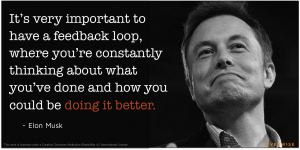What Does Emotional Intelligence have to do with Productivity and Innovation?
When you look at Elon Musk, there is almost no possible way that you can avoid being impressed. Wikipedia describes him as a business magnate, an engineer, an inventor, and an investor, as well as CEO, CTO, chairman, and founder of multiple companies, making him the 75th wealthiest person in world as of March 2016. Not only that, but Musk’s companies are all engines designed to better the world in creative, innovative ways. From the recent announcement of self-driving Teslas to Space X’s continuous struggle to revolutionize space travel, it’s hard to argue that Elon Musk and his initiatives aren’t some of the most productive and intelligent currently on the planet.
Musk, much like Steve Jobs, couples his drive and ingenuity with a fluid charm and charisma, making him and leaders of his caliber something like the Ubermensch. The amount of things that people like these accomplish might even make the common person wonder if they’re robots–but it turns out they may actually be even more human than the rest of us.
We generally don’t talk about or even think about the types of emotions that powerful business leaders like Jobs or Musk must feel, yet, we generally never question their basic humanity. We trust them because we feel like not only are they smart, but they get us. This is us subconsciously measuring something we call emotional intelligence, which includes self-awareness, eagerness to learn and adapt, empathy, dedication–basically all of the motivational and interpersonal qualities that make leaders great.
Innovation guru, Tim Brown argues that empathy and emotional intelligence is essential in today’s increasingly complex and interconnected world of product innovation. These qualities allow one to see multiple points of view from the perspective of many different types of people, a key ingredient to the most successful products. Jobs realized that people want new and cutting edge, but that it all meant nothing without a friendly user interface and dedicated customer service. Musk, on the other hand, cares so much about people that he can’t help but trying to save the world.
We can all take cues from moguls like Jobs or Musk, and not just in terms of innovation, but in terms of productivity as well. Fast Company ran an article titled “The Case for Emotional Productivity†in which they explore the differences between functional and emotional productivity. They point out that in conventional society, establishments prefer to see functional productivity because it’s easier to monitor, measure, and exert control over. They cite author David Brooks who says: “reason, which is trustworthy, is separate from the emotions, which are suspect. This has created a distortion in our culture. We emphasize things that are rational and conscious.â€
While functional productivity is a great thing to display, we would never have the iPod or any other great product their inventors weren’t excited for the impact that they’d have on the world. Imagine how stoked Musk must feel every time he goes to work, knowing that simply by commercializing self-driving cars, 3,000 lives a year would be saved–the average amount that lost in car wrecks due to human distraction and error. If he ends up getting widespread spaceflight going, he might even save the human race. What an emotional rush.
So how does this translate to you? You might not be working on the next iteration of transportation throughout the stratosphere, but you’re probably working on something and, like the rest of human the race, you’re probably not always inspired to be productive. How do you up your game on your emotional IQ?
There are three basic things they don’t teach you about keeping a job and being productive, and it’s that if you practice self-awareness, avoid knee-jerk reactions, and argue with yourself, you’ll develop begin to sharpen your EQ. The idea is that if you’re always conscious of how people are viewing you, you can begin to figure out what you do that might be off-putting or that just doesn’t come across correctly with your own communication style. Practicing patience and debating the outcomes of situations before you act can also keep you from acting impulsive or abrasively toward others.
Once you’ve begun to master your own thought process, the next step is applying that to innovation and productivity. By organizing your schedule, you can begin to anticipate your own emotional state, and deliberately alter it to get excited and become motivated.
After a little practice, it’s easy to recognize patterns [in your emotions]. Recognizing [them] can be a real benefit–capturing that moment when we have the right mental energy. – Josh Davis, psychologist
So the next time you feel like you’re drained, uninspired, or unproductive, focus on why. Try to figure out what’s exciting or intriguing about the task at hand or what it will feel like to come up with something new and inspiring. Imagine how your work is going to affect other people, both if you do and if you don’t get it done.
It may just make the difference between just another wasted day and a world-altering, life changing invention.
image credit: Flickr
Wait! Before you go.
Choose how you want the latest innovation content delivered to you:
- Daily — RSS Feed — Email — Twitter — Facebook — Linkedin Today
- Weekly — Email Newsletter — Free Magazine — Linkedin Group
 WELCOME Andrew Heikkila, a tech enthusiast and writer from Boise, Idaho, and a new contributor to Innovation Excellence. He also writes for Tech Crunch. You can follow him @AndyO_TheHammer
WELCOME Andrew Heikkila, a tech enthusiast and writer from Boise, Idaho, and a new contributor to Innovation Excellence. He also writes for Tech Crunch. You can follow him @AndyO_TheHammer
NEVER MISS ANOTHER NEWSLETTER!
LATEST BLOGS
Three things you didn’t know about credit cards
Photo by Ales Nesetril on Unsplash Many of us use credit cards regularly. From using them for everyday purchases to…
Read MoreFive CV skills of a business-minded individual
Photo by Scott Graham on Unsplash The skills listed on a CV help employers quickly understand your suitability for a…
Read More




